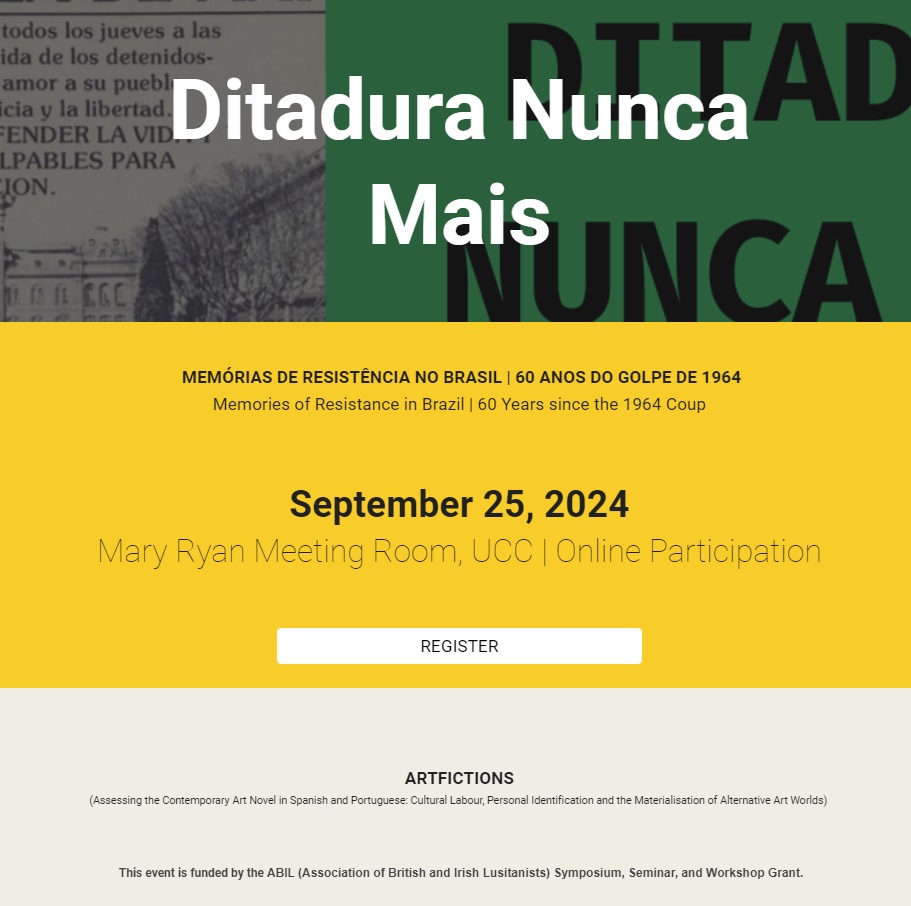News
Ditadura Nunca Mais, Memories of Resistance in Brazil

The seminar "Ditadura Nunca Mais/Dictatorship Never Again" examines the consequences of dictatorship in Brazil and the Americas on the occasion of the anniversary of the 1964 Military Coup in Brazil. The event will be hybrid and will include four interventions (two in Portuguese, two in English) by four guest speakers.
Organised by the IRC Laureate Consolidator ARTFICTIONS project and the BA in Portuguese Studies team.
More information about the seminar can be found here: https://sites.google.com/view/ucceventditaduranuncamais/home
LITERATURA, CINEMA E AUTORIA DE MULHERES NO BRASIL DA DITADURA MILITAR
Literature, Cinema, and Women’s Authorship in Brazil under the Military Dictatorship
Dr. Renata Soares Junqueira
UNESP - Universidade Estadual Paulista | São Paulo State University
Women played a crucial and systematic role in the creation, and expansion of modern Brazilian cinema, and not just as actresses. They contributed as script supervisors, screenwriters, directors, and producers. However, the diverse outcomes of their creative work have largely been erased or relegated to the background by the male-dominated film industry. Investigating and challenging the reasons for this invisibility is an urgent task. To assess the quality of Brazilian cinema made by women during the military dictatorship, we established a corpus of seven feature films by six directors who made significant contributions in the 1970s and 1980s: Os homens que eu tive (1973) by Tereza Trautman, Marcados para viver (1976) by Maria do Rosário Nascimento e Silva, Feminino plural (1976) by Vera de Figueiredo, Mar de Rosas (1977) and Das tripas coração (1982) by Ana Carolina, Amor maldito (1984) by Adélia Sampaio, and Ariella (1980) directed by John Herbert with a screenplay by Cassandra Rios.
Presentation in Portuguese.
NARRATING THE BRAZILIAN DICTATORSHIP IN THE 21ST CENTURY
Dr. Lua Lua Gill da Cruz
PUC-Rio | Pontifical Catholic University of Rio de Janeiro
Narrating a historical period is always contingent upon political, social, historical, cultural, and temporal matters. When it comes to the 20th-century dictatorships in South America’s Southern Cone and particularly the Brazilian Dictatorship of 1964-1985, that “what was” (or “what is”) is still being produced. The history of the past is reconstructed in the present when we recover, rekindle, reincorporate, and even modify the way of seeing, telling, and saying. This presentation aims to present and situate historically, socially, literarily, and temporally the cataloging of the production of long literary narratives in which the Brazilian and Southern Cone military dictatorships are literarily recovered and reconstructed in the 21st century, as well as their formal, aesthetic, and thematic relationship with the period in question.
A LITERATURE TO UNITE THE KNOTS OF THE PAST: POST-MEMORY AND TRAUMA IN THE SPIRIT OF MY PARENTS KEEPS RISING IN THE RAIN
Dr. Sergio Schargel
Literature is not a hermetic field; rather, it interacts symbiotically with other spheres, transcending disciplinary boundaries. In a region marked by authoritarianism, such as Latin America, literature itself will present and address the theme. This paper proposes, based on Patricio Pron's novel The Spirit of my Parents Keeps Rising in the Rain, a discussion on the uses of memory and post-memory to deal with the violence of the dictatorial period. Given the hypothesis that literature absorbs traits of this post-memory, it aims to contribute to the state of the art by highlighting how the author employs the detective genre to delve into the reconstruction of the past. Following this, it will also bring into the debate concepts such as post-memory, as defined by Marianne Hirsch, and theoretical texts by Robert Dahl and Vera Lúcia Follain de Figueiredo on authoritarianism and migrant narratives. It concludes that Pron's book offers authentic stories about people who fought against the Argentine military dictatorship; people who were (in)directly affected by this regime, even after it had ended—such as the narrator and Alberto Burdisso. Narratives that, through fiction, allow us to learn about, imagine, remember, and reflect on part of this past and its impacts nowadays.
ÉTICA E LEGIBILIDADE: UMA DISCUSSÃO A PARTIR DE ROMANCES RECENTES SOBRE A DITADURA BRASILEIRA
Dr. Paulo Thomaz
UnB | University of Brasília
In recent years, Brazilian literature has focused on episodes and dynamics that draw readers back to the dictatorship that took place in the country between the 1960s and 1980s. From various perspectives and narrative strategies, these fictional narratives explore the experience of authoritarianism and state violence. This presentation aims to discuss the ethical implications related to the readability of discursive processes and the "realist" narrative construction that this experience, conveyed through fiction, supports. This discussion is set against the backdrop of the 21st century, marked by increasing social fragmentation, widening inequality, and the neo-authoritarian policies promoted by the global far right.
Presentation in Portuguese.
